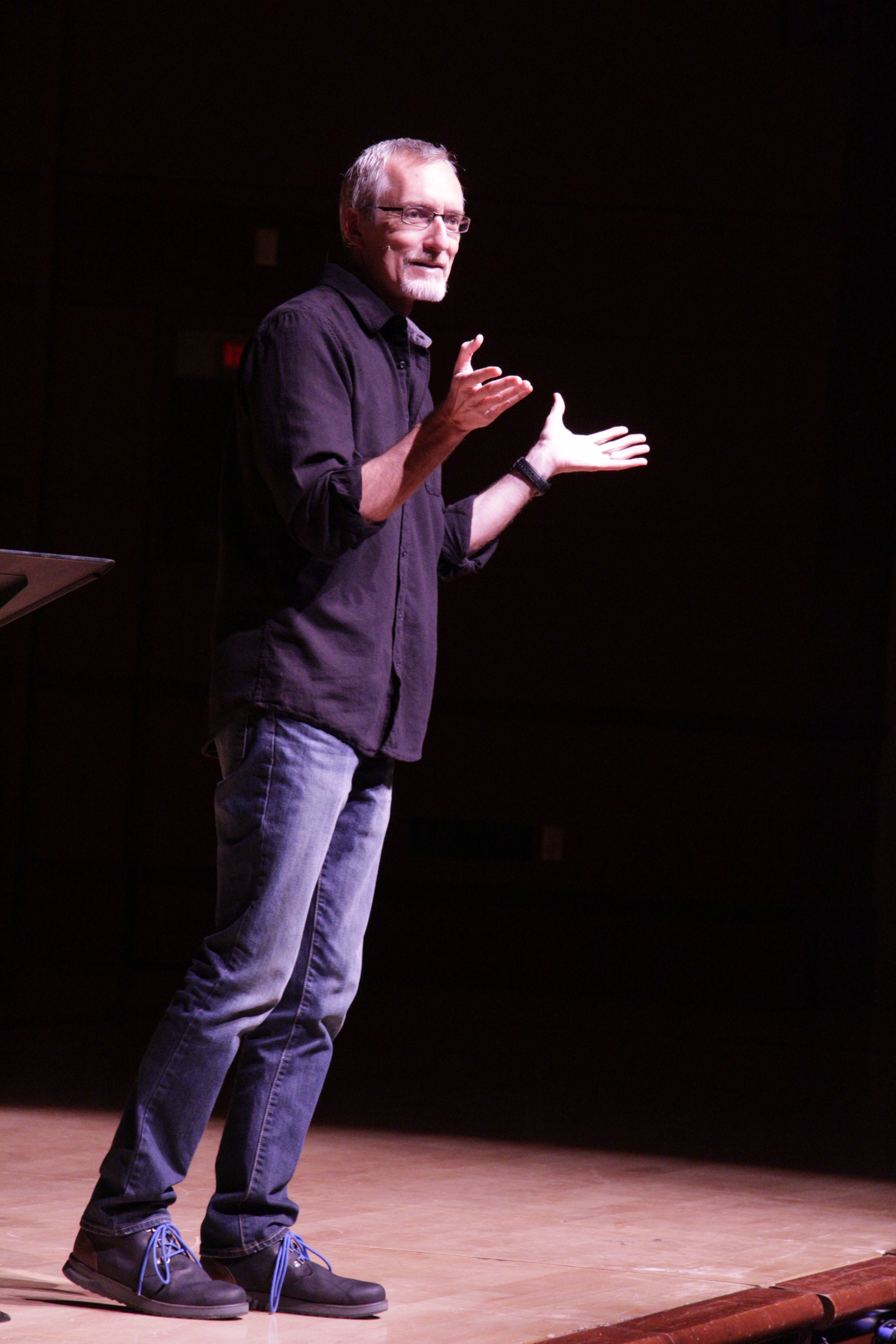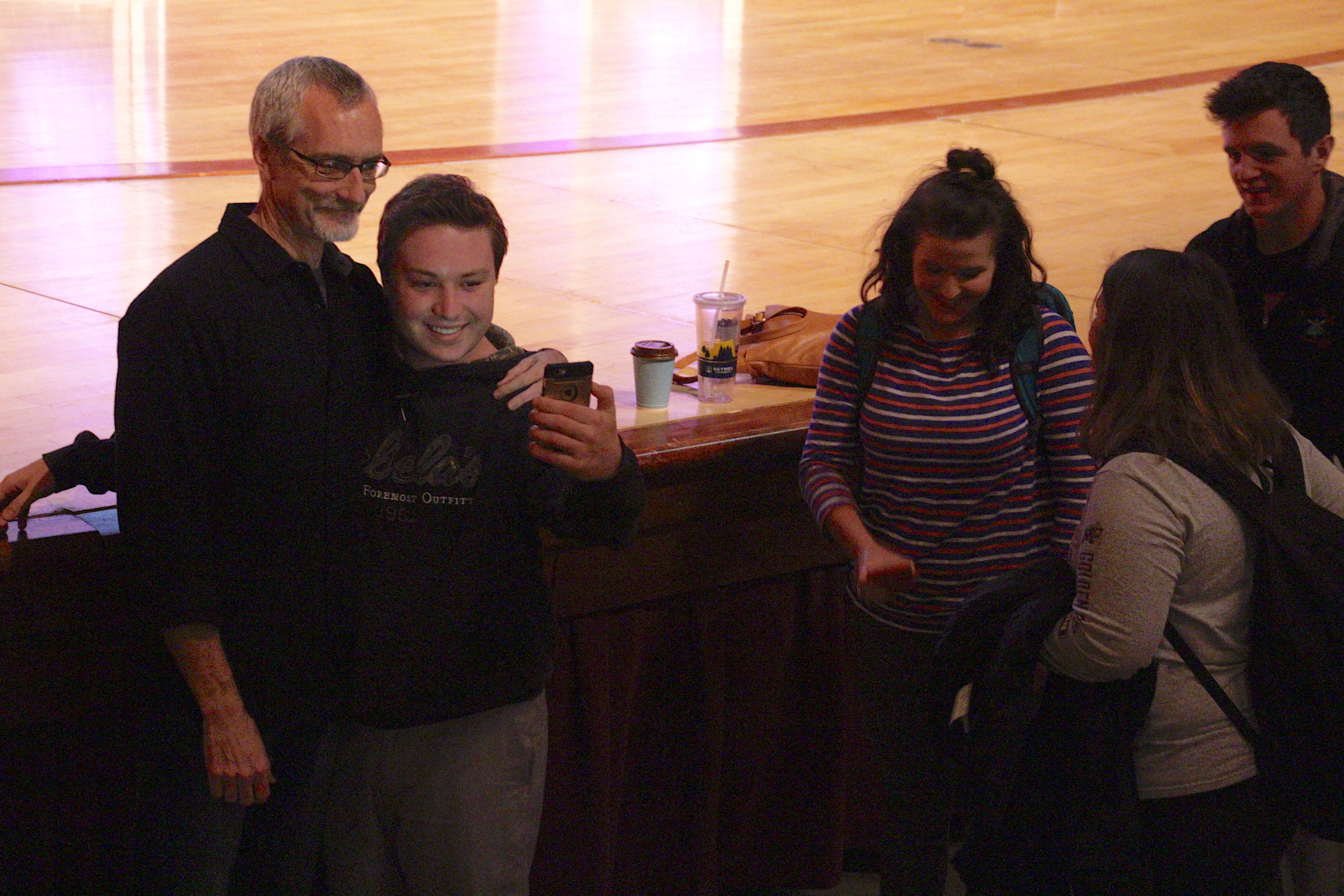Phil Vischer, creator of Christian animated series VeggieTales, speaks at chapel about what to do when your dream dies.
Words by Christine Schuster | Photos by Callie Schmidt

Six years before “Toy Story” hit theaters as the first computer-animated movie, Phil Vischer was working around the clock in a rented storefront in downtown Chicago to create what he describes as, “bald, limbless, nude characters,” he intended to use to tell Bible stories.
Vischer, the creator of “VeggieTales”, spoke in chapel today to close a week of guest speakers. As he shared stories of his success and sudden failure, he allowed his voice to slip into a slight voice crack at the top of his vocal register, becoming Bob the Tomato. The character is familiar to ⅓ of American children, who grew up with “VeggieTales” in their home.
First, Vischer sampled the unmistakable sounds of his famous characters to a laughing and cheering audience– the lifelong duty of a voice actor.
“If the church was open, we were inside it,” Vischer said about his childhood. Like the audience he would eventually cater to, he grew up going to countless church events.
He knew at a young age he was gifted in storytelling and planned to attend film school after college. After three semesters, Vischer was expelled from his Christian college for violating the chapel attendance policy and it was time to get to work.
His mission was to impact the world with the Gospel of Jesus Christ. At 24 years old, he began creating characters for a children’s show. His wife discouraged his original idea of using candy bars and they decided no parent could complain if their kids fell in love with vegetables.
“He’s alive!”
Soon after, Vischer remembers exclaiming, “He’s alive!” at a demo video he created of a cucumber poking his head out of a bowl and jumping out in front of the camera. This character would become known as Larry the cucumber, a silly one-toothed cucumber and half of the central duo on “VeggieTales.”
Vischer next created Larry’s counterpart, a reasonable tomato named Bob. He voiced both characters. His next demo video showed Bob giving an impassioned speech about how the world needed a children’s show with vegetables to teach Bible stories.
“It’s easier to fail than to really succeed. It changes your life less.”
Vischer was given $80,000 out of a retirement fund to get his limbless-characters on their feet. He quit his job and hired two art students to begin animating episodes. The three animators worked around the clock on one computer to create the show. In 1994, “VeggieTales” sold 500 copies from ads they bought in magazines. By 1996, the show had sold 2 million copies and the Wall Street Journal ran a headline reading, “move over Barney”.

“It’s easier to fail than to really succeed,” Vischer said. “It changes your life less.”
“VeggieTales” has sold over 65 million copies to date and was unexpectedly popular on college campuses, even ranking in a CNN poll on the top-ten most watched videos on college campuses.
For seven years, sales doubled and Vischer employed 200 to his company, Big Idea Productions. But by mid-2000, sales stopped and he realized he might lose it all.
“How could God let something that’s doing good fall apart?”
The final blow came when Vischer was sued on a verbal agreement made with a production company. Though Vischer maintains his innocence in the trail, he lost everything and Big Idea Productions went bankrupt.
“How could God let something that’s doing good fall apart?” Vischer recalls asking repeatedly as his company declined and collapsed.
In the next part of his life, Vischer felt “something dying inside.” His ambition, his hopes and his dreams faded away. Vischer’s lesson was this: God needs followers who will let go of everything besides him. In losing everything, Vischer learned how to wait on God. In that space, God moves.
Commenting on the chapel, Bethel Pastor Laurel Bunker said, “Phil lost his company, his characters and his dream, but he didn’t lose his relationship with God.”
“Phil lost his company, his characters and his dream, but he didn’t lose his relationship with God.”

![Nelson Hall Resident Director Kendall Engelke Davis looks over to see what Resident Assistant Chloe Smith paints. For her weekly 8 p.m. staff development meeting in Nelson Shack April 16, Engelke Davis held a watercolor event to relieve stress. “It’s a unique opportunity to get to really invest and be in [RAs’] lives,” Engelke Davis said, “which I consider such a privilege.”](https://thebuclarion.com/wp-content/uploads/2024/05/041624_KendallEngelkeDavis_Holland_05-1200x800.jpg)















